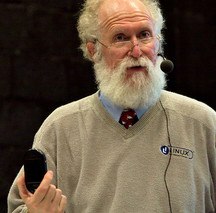 Jon “maddog” Hall wrote a beautiful essay in honor of Alan Turing that highlights the terrible, corrosive consequences of attacking people for who they are.
Jon “maddog” Hall wrote a beautiful essay in honor of Alan Turing that highlights the terrible, corrosive consequences of attacking people for who they are.
“If you are homophobic, you probably want to stop reading now.” And so begins Jon “maddog” Hall’s beautiful, brilliant essay on being homosexual, and the terrible high price paid by LGBT people even today just for being who they are.
Acceptance of homosexuality is one bit of genuine progress in the U.S. We still have a good ways to go, but in the past ten years or so there has been an amazing shift in attitudes. I roll my eyes at the phrase “acceptance of homosexuality” because whether a person “accepts” it or not has nothing to do with people who are homosexual, heterosexual, bisexual, transgendered, non-gendered, or whatever else they might be. Accepting or not-accepting only changes how we treat each other, and how we treat each other is everything.
The Problem with Bigotry
But sadly, humans being what we are, it is something that a lot of people get excited about. Now here is the big problem with any kind of bigotry, and this is something that should especially resonate with Linux and FOSS supporters, because supposedly we have this culture of science and meritocracy: the big problem with bigotry is it assumes non-existent knowledge. When we have bigoted beliefs, we think we know something when we don’t.
I call it the Those People Syndrome. Oh, Those People are so [fill in the blank]. In the case of gay people pick your adjectives: Flamboyant. Butchy. Pansy. And so on, and at best it’s only a tiny bit true, and never complimentary. Why? Because it has nothing to do with our fellow humans as individuals. It’s a construct for denying the humanity of our fellow travelers in life.
There is an academic term for Those People Syndrome, othering. Othering is the most commonly-used tool of division. It is a potent and very effective way of demonizing people, and justifying mistreating them. Othering means “not like us.” Those people, they’re dirty, stupid, immoral, evil, lazy, undeserving. We need to take steps against Those People or They will do bad things to us. Those People are enemies.
Hiding Who We Are
Maddog’s essay saddened me because he described hiding himself to protect his parents, and to protect Linux and Free Software. Families are personal problems, but nobody involved with Linux and Free Software should ever feel like they have to hide who they are. And yet we do, because we do get attacked for who we are, sometimes savagely. I can hide being a lesbian, but I can’t hide being a woman, and in this fine new millennium an awful lot of people still can’t deal with the notion that women are people.
I can recall more than one discussion on sexism in Linux and FOSS that turned angry, and distressed souls offering “What does it matter? On the Internet no one needs to know who you really are.” It is meant kindly, but it misses the point– nobody should ever have to hide who they are just to avoid being abused.
Ironically, both sides of this equation are fueled by fear. Think about it. Think also how fear fuels anger, and how anger is so much easier than love, and why this is so.
Yes, the D Word
Acceptance is everything. Community is everything. How we treat each other is everything. Albert Einstein is often quoted as saying:
“Imagination is more important than knowledge. For knowledge is limited, whereas imagination embraces the entire world, stimulating progress, giving birth to evolution. It is, strictly speaking, a real factor in scientific research.”
Where does imagination come from? Diversity. A lack of diversity leads to a lack of imagination. We need each other. While it’s good to cultivate a culture of, at the very least, not being mean to people, it’s even better to invite people in and build good relationships, and to seek out Those People, the ones who are not like us. The Apache Foundation says “if we look after the community then good code will emerge from that community.” Dreamwidth says “We believe in being inclusive, welcoming, and supportive of anyone who comes to us with good faith and the desire to build a community.”
I made a decision long ago to be as visible as possible, flaws and all, to be a role model for all of Those People like me. Being visible, not hiding, and refusing to let bigotry take away your own unique individual voice is one of the most powerful acts any individual can do. But that’s only half of the deal– the other half is you and me and everyone need to see each other as we are, without constructs, and with acceptance.


